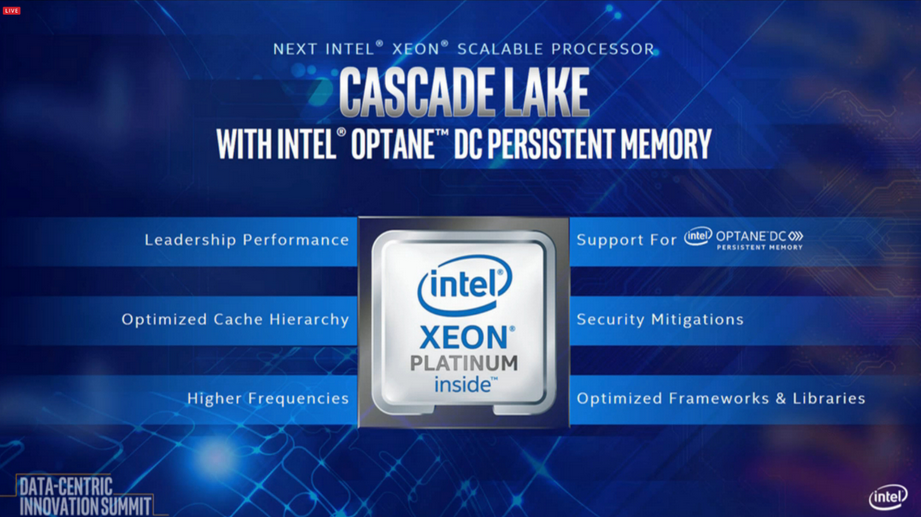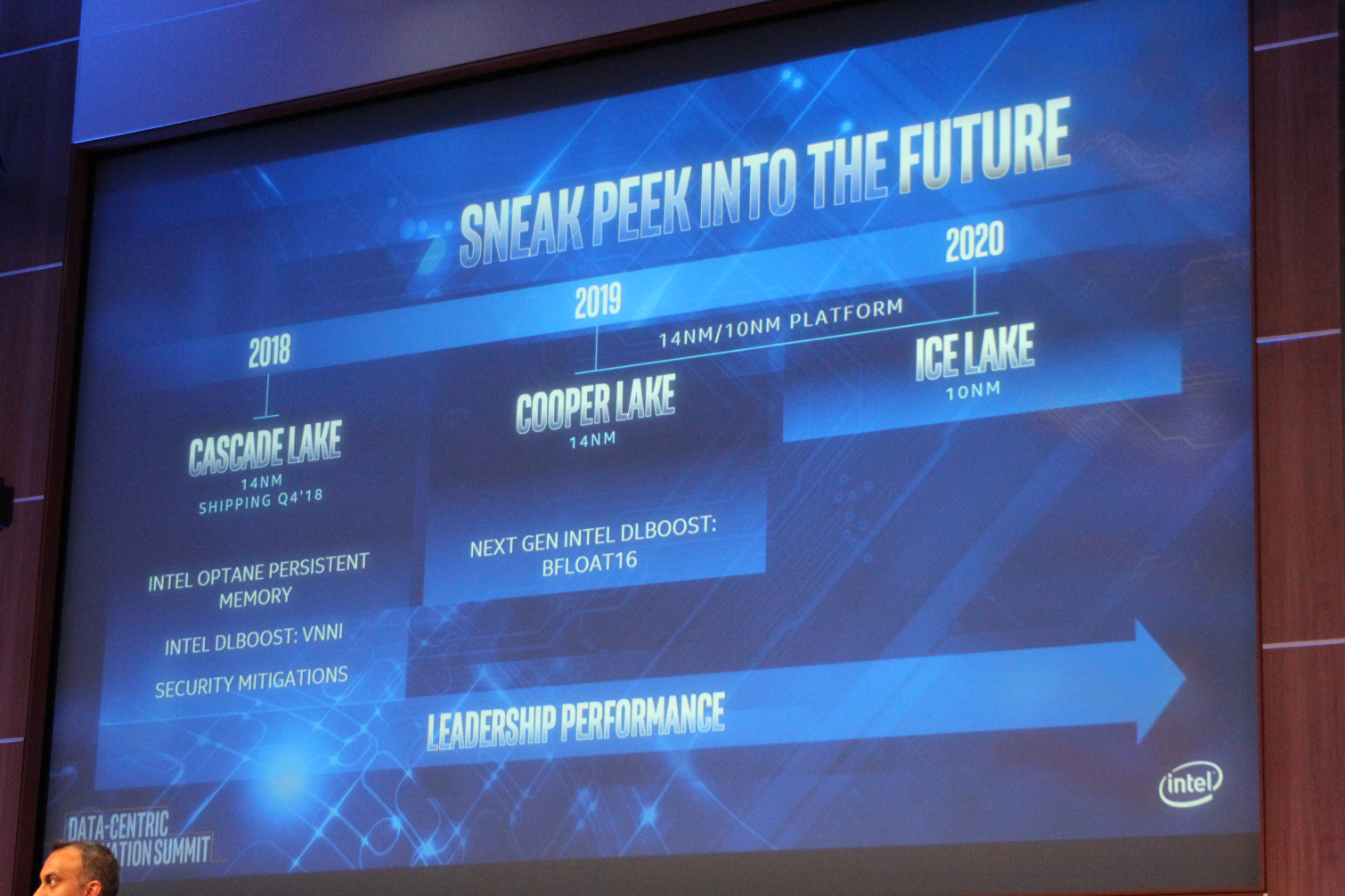Intel's New Roadmap Revealed: 10nm Ice Lake In 2020, 14nm Cooper Lake 2019
Today Intel finally revealed its new roadmap at its Data-Centric Innovation Summit in Santa Clara, CA. Intel's recent admission that its 10nm process is delayed until 2019 will obviously have an impact on its long-term roadmaps, but the company hasn't shared details about how it will adjust its future plans to accommodate the delays.
Intel's Cascade Lake is coming to market in 2018. The 14nm processors support the long-overdue Intel Optane Persistent Memory, which was originally slated for release with the Skylake Xeon family. Intel integrated a new memory controller in Cascade Lake to support the new Optane DIMMs. This will also be the first generation of Xeon processors with in-silicon mitigations for the Spectre/Meltdown vulnerabilities. So these chips will likely spur a healthy refresh cycle in the data center.
Intel also says Cascade Lake will have an optimized cache hierarchy, but it didn't provide further details there. Intel's current-gen Xeon Scalable processors already have a "re-balanced" cache hierarchy, so it will be interesting to see what changes the company has made to further optimize the hierarchy. Intel has also added support for DLBoost, which is a new AVX-512 optimization for machine learning applications.
The Cooper Lake-SP processors will come to market in 2019, with the most notable addition being Intel's adoption of Bfloat 16, which is Google's new floating-point format. This exciting development should provide tangible boosts to machine learning operations. The 14nm Cooper Lake processors are widely considered a stop-gap measure by Intel to bridge between current 14nm and the overdue 10nm processors. This generation of processors will likely come with the 14nm++ process, which is yet another iteration of Intel's mature 14nm node.
Intel's Navin Shenoy, the executive vice president and general manager of the Data Center Group at Intel, said that the Cooper Lake-SP platform will be compatible with the forthcoming 10nm Ice Lake-SP processors that will arrive in 2020. That means the new Cooper Lake platform will arrive with the LGA4198 socket on the rumored Whitley platform.
Intel's decision to provide forward socket compatibility between Cooper Lake and Ice Lake processors is a welcome announcement, because Cooper Lake should arrive not long after--especially by the standards of this market. The capability to simply update server platforms from 14nm to 10nm processors should help assuage customers who are reluctant to adopt short-lived product generations.
We're here at the event for technical sessions for the rest of the day and will update this article if we learn more.
Get Tom's Hardware's best news and in-depth reviews, straight to your inbox.

Paul Alcorn is the Editor-in-Chief for Tom's Hardware US. He also writes news and reviews on CPUs, storage, and enterprise hardware.
-
velocityg4 So, that means no 10nm until at least 2021, 2025 to be safe. Intel will be on 14nm+++++++++++++++++++++++++++++++ while AMD will have had a few years maturation of 7nm.Reply -
Martell1977 So basically, the problems with their 10nm process is worse than we thought. Almost seems like they had to backtrack and start over to some extent.Reply
I was expecting 10nm sometime in 2019, but being pushed to 2020 is a serious delay. Wish Intel would just come clean and say what the problems are.
Guess we have 2+ more years of feature and incremental updates. Perhaps Intel will finally catch up to AMD on core count. -
valeman2012 Reply21215573 said:So, that means no 10nm until at least 2021, 2025 to be safe. Intel will be on 14nm+++++++++++++++++++++++++++++++ while AMD will have had a few years maturation of 7nm.
Does not seem that AMD 7nm beats Intel 14nm still how come? -
SkyBill40 Reply21215648 said:"LEADERSHIP PERFORMANCE"
lol. Yeah Intel, not this year, and maybe not the next.
Intel arguably lost their market lead probably two years ago when AMD started to make genuine headway with the Ryzen platform. AMD's success has forced Intel into a panic mode of sorts and had that not happened, a lot of what has been forced may not have come to pass at all. For evidence of that, look how long it took Intel to advance beyond 4 cores CPUs for the consumer market. Intel has rested comfortably on their laurels for so long they failed to notice they had been ignited from beneath.
There is a likelihood, albeit small, that Intel never regains their market lead without a significant breakthrough to push them ahead. Times are looking truly desperate for Intel and what comes of that will be telling. -
InvalidError Reply
10nm in 2018 could already be considered a serious delay since 10nm was originally expected back in 2016. Problems started with the initial slip-ups when Broadwell got delayed by a year due to issues with 14nm which degenerated to tick-tock-tock-tock-tock-tock-tock-tock-tock-tock development cycle afterward due to on-going delays with 10nm.21215632 said:I was expecting 10nm sometime in 2019, but being pushed to 2020 is a serious delay. Wish Intel would just come clean and say what the problems are.
If AMD manages to deliver the expected results from Zen 2 / Ryzen 3 next year, Intel will be in an uncomfortable spot. -
Groveling_Wyrm Reply21215826 said:21215648 said:"LEADERSHIP PERFORMANCE"
lol. Yeah Intel, not this year, and maybe not the next.
Intel arguably lost their market lead probably two years ago when AMD started to make genuine headway with the Ryzen platform. AMD's success has forced Intel into a panic mode of sorts and had that not happened, a lot of what has been forced may not have come to pass at all. For evidence of that, look how long it took Intel to advance beyond 4 cores CPUs for the consumer market. Intel has rested comfortably on their laurels for so long they failed to notice they had been ignited from beneath.
There is a likelihood, albeit small, that Intel never regains their market lead without a significant breakthrough to push them ahead. Times are looking truly desperate for Intel and what comes of that will be telling.
Intel hasn't lost any market share lead to anyone in years. Could it happen? Yes, Will it happen, probably not. Intel puts more money into their R&D than AMD earns in a given year. That is how big Intel really is, and how small AMD really is.
If Intel really wanted to push AMD to its limits, all they would have to do is start lowering the prices of their processors. This would force AMD to lower its prices as well, and lower its profits to not much if anything at all. Intel has the money to withstand the couple of years it would take to make AMD go bankrupt.
Now that ARM is producing CPU's, AMD doesn't need to be around in order to keep Intel from a monopoly. To me, THAT is the bigger worry. You mentioned the years it took to get away from 4 core, well.....we could see that again..... -
JamesSneed This is going to make for a rather interesting 2019. Lisa Su's move to TSMC for EPYC may turn out to be one of the most well thought plans in AMD's history if it lets them capitalize on on 7nm sooner. AMD could own the growth in the data center market in 2019 if things work out as planned. Stocking up on popcorn for 2019.Reply -
bit_user Reply
In a very real sense, it's to be expected.21215513 said:Intel's decision to provide forward socket compatibility between Cooper Lake and Ice Lake processors is a welcome announcement, because Cooper Lake should arrive not long after--especially by the standards of this market.
Since Sandybridge-E, Intel has updated their server socket every second generation of CPUs. This is simply a continuation of that cadence, although I realize the turmoil created by their 10 nm delays mean it was far from a given.

